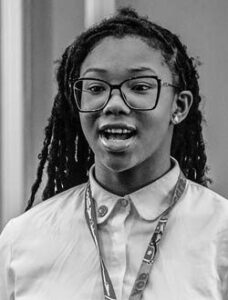Taniya Keller is just weeks away from graduating, but she’s well prepared to take on college and find a job afterwards thanks to her school’s Jobs for America’s Graduates (JAG) program.
“The program has prepared us on how to conduct ourselves in an interview, how to write letters, how to write our professional and educational resumes, how to dress, and how to build connections with people because you never know where they might take you,” the Columbia High School senior said.
Richland One’s JAG program gives high school students the skills and support they need to succeed in education, employment and life. The program expanded to all of Richland One’s high schools and Richland One Middle College approximately two years ago, after being available only at C.A. Johnson High School for several years.
Each school is allowed to select up to 60 students per semester for their JAG programs. Chris Dinkins, Richland One’s director of career of technical education who serves as the district liaison for the JAG program, says many of the students selected are “bubble students,” those who may need a little extra influence deciding what they want to do after graduation.
“Through JAG, students are able to get that very narrowly focused kind of intent on their career and post-secondary plans,” said Dinkins.
Each high school has a JAG specialist who decides which students can join the program and what the students’ lessons and activities will be. This includes work-based learning, guest speakers, field trips, resume’ and cover letter writing, and community service.
Dinkins says what makes JAG different from other college and career-readiness programs is the availability and one-on-one focus JAG specialists can have with students.
“Seeing the students every day, the JAG specialists really get to learn their students and they really get to help the students figure out how to learn about themselves. They see students develop and see their interests,” he said.
Dinkins says the success of a JAG program depends on the specialist’s ability to connect with the community.
LaTonya Jackson, Columbia High’s JAG specialist, has only been in the position for about a year. In that short amount of time, she’s been able to form partnerships with a handful of organizations and businesses, including the City of Columbia, the National Guard, Founders Bank, Firehouse Subs, and EMS Closet.
“Community partnerships drive our program. The more community partners we have, the better our program is going to be,” said Jackson.
Through the partnership with the City of Columbia alone, Columbia High’s JAG students got the chance to meet Mayor Daniel Rickenmann, and Taniya will be interning with the city this summer as a park leader aide. Jackson recalls how Taniya’s experience learning how to network, work a room, and assert herself helped her get the internship.
“Taniya was offered the internship job through the [district’s] Opportunity Fair, but she did not get the job. When we went directly to the City of Columbia, Taniya made sure she had all her stuff and her portfolio. She was able to ask why she didn’t get the job. The next thing you know, Taniya got a call within 24 hours saying she got the job,” Jackson said.
JAG also teaches students about the importance of community service. One of the local non-profits that Columbia High’s JAG program has worked with is Revolution Red, which is dedicated to providing menstrual products for women in need. Taniya and her classmates packed bags filled with menstrual products for Revolution Red to distribute.
“Unfortunately, there are a lot of women who have to choose between getting food and paying their bills over getting simple products for something that happens to our bodies,” she said.
Taniya will be attending Johnson C. Smith University in Charlotte, North Carolina this fall, where she will major in psychology. Her JAG journey, however, will not end when she goes to college. JAG specialists must follow students once a month for 12 months after they graduate from high school, giving them support and resources when necessary.
“Let’s say that after Taniya graduates, she’s struggling with paying for school. I can tell her, ‘Hey, here’s a scholarship application. Fill it out,’” said Jackson.
Dinkins says tracking the students after graduation lets JAG specialists know how lasting their impact was and how much the program helped.
“You want to be able to track how many of the students, after coming through JAG, were able to enlist, enroll or be employed,” he said.
Taniya encourages other students to join JAG because of the opportunities she’s had.




Loading Comments